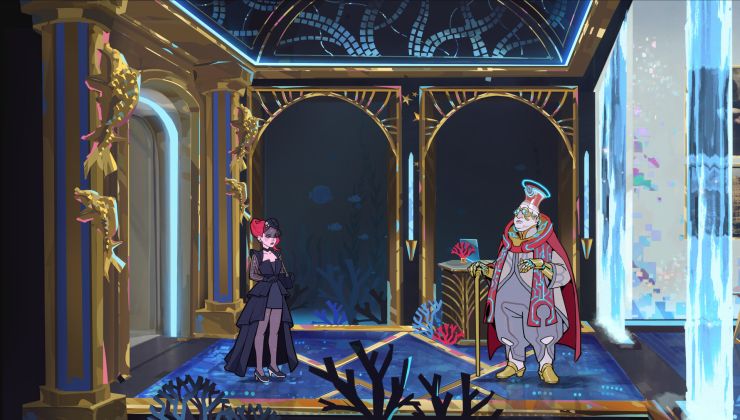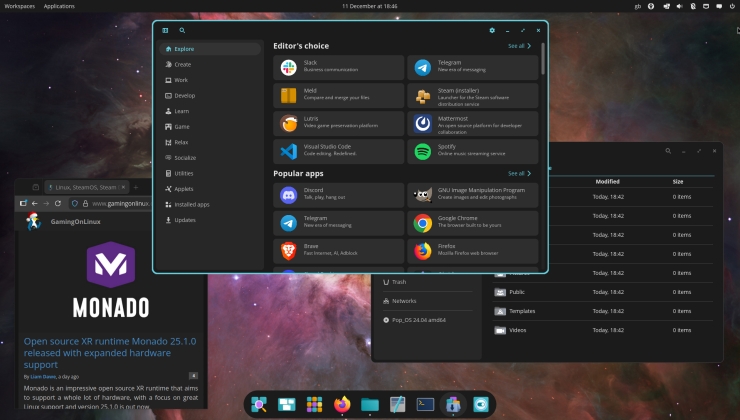Are you on Debian and keep missing packages or want some of the latest applications on top of your stable system? Say hello to the brand new Debian User Repository in the style of the Arch User Repository. It only got announced a couple of days ago so it's very fresh-faced and so there's not many packages yet, but it could end up being something revolutionary for Debian - perhaps anyway.
The creator, Hunter Wittenborn, mentioned how they initially started off developing makedeb, which makes Debian packages from Arch PKGBUILDs as they loved "Arch Linux's simple and efficient PKGBUILD format for creating packages". Another project, mpm, came later as a package manager for makedeb to make it even easier. So the Debian User Repository seems like the natural evolution of their ongoing work.
As an Arch Linux user myself (there's a joke there somewhere…) thanks to EndeavourOS making the setup easy I've found the Arch User Repository to often be an invaluable tool.
What do you think? Will you use it or contribute to it or do you not like the idea of it? Let us know in the comments.
Quoting: sigmichMain reason I don't use Debian a while are outdated Nvidia drivers because I need stable branch for some specific software. Could DUR be used also for installing graphic drivers?Backports has the latest stable drivers.
The philosophy behind Arch is also part of what makes the AUR great -- Keep It Simple Stupid.
I don't mind Debian stealing a page from Arch's book but I would really be encouraged to see everyone steal a page from Gentoo's book and essentially be able to install packages by compiling them from source with custom patches or installing bins.
Quoting: ElectricPrismThe AUR is a great feature but mainly because the maintainers do such a good job curating content & keeping it up to date and fresh.I mean isn't that basically what AUR does? It just simplifies that with PKGBUILDs, but the PKGBUILDs pretty much do the 'git clone', patch, make, etc. Or if it's officially part of ARCH, it's a bin.
The philosophy behind Arch is also part of what makes the AUR great -- Keep It Simple Stupid.
I don't mind Debian stealing a page from Arch's book but I would really be encouraged to see everyone steal a page from Gentoo's book and essentially be able to install packages by compiling them from source with custom patches or installing bins.
As far as releases go, ARCH has always seemed more stable to me than Gentoo.
Quoting: slaapliedjeThat's what I wanted to recommend as well. If you need to, you can even use the Nvidia driver from experimental (fear though not!). The driver seems to be so separated from the rest, this never gave me headaches either. But backports should be optimal.Quoting: sigmichMain reason I don't use Debian a while are outdated Nvidia drivers because I need stable branch for some specific software. Could DUR be used also for installing graphic drivers?Backports has the latest stable drivers.
For server usage this sounds even greater on paper (a rock-solid system coupled with a few hand-selected up-to-date software/services? yay!) until you remember that this is a problem that has already been solved since a few years ago by Docker et al. Why have a DUR app messing with my rock-solid Debian system, when I can have a properly sandboxed container that does not pollute whatsoever the rest of my system?
TL;DR the DUR sounds great in theory but IMHO is actually not that great in practice. Maybe if it came a few years earlier it could have seized the day on the server in place of containers, but as it is now it seems more like a solution without a problem.
Dislaimer: I'm an Arch user who otherwise loves the AUR and its broad possibilities for a desktop distro (was one of the three main reasons I eventually ended up on Arch for the long-term, the other two being its rolling nature and its minimalism that allowed me to tailor my system exactly as I want it) and I'm even maintaining a few AUR packages myself. Though to be honest, the onset of Flatpak seems to be slowly spelling the end of the AUR as well. Not yet, but I'd say give it 5 years and people on other distros will be able to do with Flatpaks what Arch has been doing with the AUR since forever, only better than the AUR.
- The author uses Ubuntu and has probably never made a classic Debian package even "unofficial".
- It doesn't really support Debian, but Ubuntu and the author consider it "the same" (watch out for names and versions of dependencies which may not be the same between Debian and Ubuntu).
- It uses PKGBUILD with an equivalent of makepkg for Debian named makedeb.
- It doesn't work with apt, it requires separate tools.
- The packages are compiled on the user's machine, this requires installing the build dependencies, the author probably does not know pbuilder / cowbuilder.
- It hardly supports any functionality of debhelper (like service management, debconf, running unit tests, etc.).
- The author used the Debian name without permission, "Debian User Repository" will probably be renamed shortly.
Quoting: Nibelheim- It doesn't really support Debian, but Ubuntu and the author consider it "the same" (watch out for names and versions of dependencies which may not be the same between Debian and Ubuntu).Even Debian has 3 different versions (4 with oldstable) with different versions of libraries. I wonder how these PKGBUILDs will manage this?
(Arch has 2 versions + Manjaro, but they differ very little)
Quoting: axredneckThis is why I stick with backports (if I really want something stable) or just run testing.Quoting: Nibelheim- It doesn't really support Debian, but Ubuntu and the author consider it "the same" (watch out for names and versions of dependencies which may not be the same between Debian and Ubuntu).Even Debian has 3 different versions (4 with oldstable) with different versions of libraries. I wonder how these PKGBUILDs will manage this?
(Arch has 2 versions + Manjaro, but they differ very little)
I've ran Debian for decades at this point (even the same install on some systems and have just upgraded to the next stable release when it is ready). For desktop systems I just run testing, which the only time it gets semi-old is when they do a freeze in preparation for making the switch to it being the stable branch. This can last from 1 to 6 months sometimes, but when you look at the grander scale of things, that's not like it's ancient (libraries generally don't drop compatibility that often). Testing is basically Debian's rolling release.
Kind of sad that he just slapped the Debian name on there and considered them compatible. Ubuntu is a fork off of Debian Sid done every 6 months... Debian stable (if that is what he's targeting) has the potential of having 2 year old or more stuff in it.. Also one of the things that make PKGBUILDs easy to implement in Arch is that they don't differentiate -dev packages, and include the source with the binary.
Quoting: axredneckArch has 1 version since 2017, i686 support stoped. And before, the only difference was just 64 bits libs wasn't accessible to 32 bits Arch. Otherwise, everything was same (packages name etc...)Quoting: Nibelheim- It doesn't really support Debian, but Ubuntu and the author consider it "the same" (watch out for names and versions of dependencies which may not be the same between Debian and Ubuntu).Even Debian has 3 different versions (4 with oldstable) with different versions of libraries. I wonder how these PKGBUILDs will manage this?
(Arch has 2 versions + Manjaro, but they differ very little)
Manjaro is not Arch. Manjaro use his own repositories. Like Ubuntu is not Debian.
AUR has no Manjaro support. If something is not working on Manjaro, never ask about a fix to an AUR packager...
Quoting: NibelheimI meaned 2 versions: stable and testing.Quoting: axredneckArch has 1 version since 2017, i686 support stoped. And before, the only difference was just 64 bits libs wasn't accessible to 32 bits Arch. Otherwise, everything was same (packages name etc...)Quoting: Nibelheim- It doesn't really support Debian, but Ubuntu and the author consider it "the same" (watch out for names and versions of dependencies which may not be the same between Debian and Ubuntu).Even Debian has 3 different versions (4 with oldstable) with different versions of libraries. I wonder how these PKGBUILDs will manage this?
(Arch has 2 versions + Manjaro, but they differ very little)
Manjaro is not Arch. Manjaro use his own repositories. Like Ubuntu is not Debian.
AUR has no Manjaro support. If something is not working on Manjaro, never ask about a fix to an AUR packager...
Quoting: NibelheimI thought Arch supported ARM now?Quoting: axredneckArch has 1 version since 2017, i686 support stoped. And before, the only difference was just 64 bits libs wasn't accessible to 32 bits Arch. Otherwise, everything was same (packages name etc...)Quoting: Nibelheim- It doesn't really support Debian, but Ubuntu and the author consider it "the same" (watch out for names and versions of dependencies which may not be the same between Debian and Ubuntu).Even Debian has 3 different versions (4 with oldstable) with different versions of libraries. I wonder how these PKGBUILDs will manage this?
(Arch has 2 versions + Manjaro, but they differ very little)
Manjaro is not Arch. Manjaro use his own repositories. Like Ubuntu is not Debian.
AUR has no Manjaro support. If something is not working on Manjaro, never ask about a fix to an AUR packager...
Quoting: slaapliedjeArchARM exist but it's an independant project. You can't find any information about ArchARM on [main arch website](https://archlinux.org/).Quoting: NibelheimI thought Arch supported ARM now?Quoting: axredneckArch has 1 version since 2017, i686 support stoped. And before, the only difference was just 64 bits libs wasn't accessible to 32 bits Arch. Otherwise, everything was same (packages name etc...)Quoting: Nibelheim- It doesn't really support Debian, but Ubuntu and the author consider it "the same" (watch out for names and versions of dependencies which may not be the same between Debian and Ubuntu).Even Debian has 3 different versions (4 with oldstable) with different versions of libraries. I wonder how these PKGBUILDs will manage this?
(Arch has 2 versions + Manjaro, but they differ very little)
Manjaro is not Arch. Manjaro use his own repositories. Like Ubuntu is not Debian.
AUR has no Manjaro support. If something is not working on Manjaro, never ask about a fix to an AUR packager...
It's another distro based on Arch, maintained partially by the main Arch team.
And yes AUR packages usually works on ArchARM (I use it on PinePhone) but sometimes packages are x86_64 compatible only.
Quoting: NibelheimSomethings are simply written to only work on x86 or x86_64. Which is why most will end up having to rebuy their software for their Macs when they upgrade to arm ones.Quoting: slaapliedjeArchARM exist but it's an independant project. You can't find any information about ArchARM on [main arch website](https://archlinux.org/).Quoting: NibelheimI thought Arch supported ARM now?Quoting: axredneckArch has 1 version since 2017, i686 support stoped. And before, the only difference was just 64 bits libs wasn't accessible to 32 bits Arch. Otherwise, everything was same (packages name etc...)Quoting: Nibelheim- It doesn't really support Debian, but Ubuntu and the author consider it "the same" (watch out for names and versions of dependencies which may not be the same between Debian and Ubuntu).Even Debian has 3 different versions (4 with oldstable) with different versions of libraries. I wonder how these PKGBUILDs will manage this?
(Arch has 2 versions + Manjaro, but they differ very little)
Manjaro is not Arch. Manjaro use his own repositories. Like Ubuntu is not Debian.
AUR has no Manjaro support. If something is not working on Manjaro, never ask about a fix to an AUR packager...
It's another distro based on Arch, maintained partially by the main Arch team.
And yes AUR packages usually works on ArchARM (I use it on PinePhone) but sometimes packages are x86_64 compatible only.







 How to setup OpenMW for modern Morrowind on Linux / SteamOS and Steam Deck
How to setup OpenMW for modern Morrowind on Linux / SteamOS and Steam Deck How to install Hollow Knight: Silksong mods on Linux, SteamOS and Steam Deck
How to install Hollow Knight: Silksong mods on Linux, SteamOS and Steam Deck